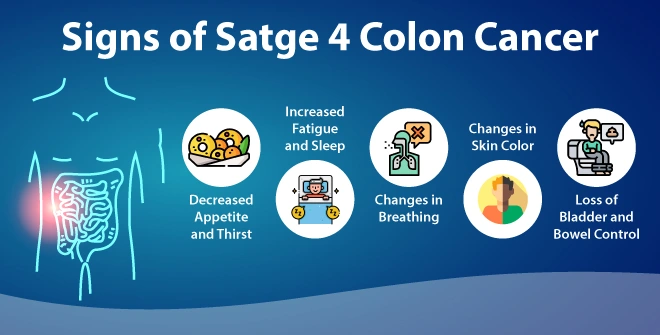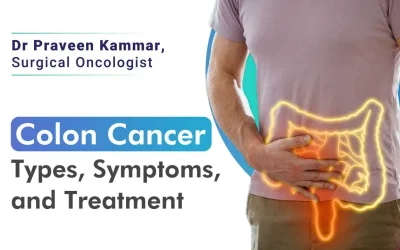Understanding Stage 4 Colon Cancer Final Symptoms
Stage 4 colon cancer is a critical phase of the disease, marked by the spread of cancer cells to other organs and tissues within the body.
As patients and families face this challenging stage, it is essential to understand the final symptoms and the importance of compassionate end-of-life care.
Read along as we delve into the complexities of stage 4 colon cancer and the compassionate care necessary to navigate this final phase with dignity and grace.

Stage 4 Colon Cancer in a Brief
Stage 4 colon cancer, also known as metastatic colon cancer, is the most advanced stage of the disease, characterized by the spread of cancer cells from the colon to distant organs and tissues, such as the liver, lungs, or peritoneum.
At this stage, patients may experience a range of symptoms that can significantly impact their quality of life.
Understanding these final symptoms, as well as the importance of early detection and treatment, is crucial for both patients and their families as they navigate this challenging phase.
Colon cancer is a malignancy that begins in the large intestine (colon), typically affecting the inner lining of the colon walls.
The exact cause of colon cancer is not fully understood, but it is believed to result from a combination of genetic and environmental factors.
Some common risk factors of colon cancer include age (over 50), a personal or family history of colon cancer or polyps, inflammatory bowel diseases (Crohn’s disease or ulcerative colitis), a diet high in red or processed meats, obesity, smoking, and excessive alcohol consumption.
Colon cancer progresses through four main stages:
- Stage 1: The cancer is confined to the inner lining of the colon.
- Stage 2: The cancer has grown through the wall of the colon but has not yet spread to nearby lymph nodes.
- Stage 3: The cancer has spread to nearby lymph nodes but not to distant organs.
- Stage 4: The cancer has metastasized to other organs and tissues within the body.
Early detection and treatment of colon cancer are paramount for improving patient outcomes and increasing survival rates.
When caught early, colon cancer can often be treated successfully through surgery, chemotherapy, or targeted therapy.
Regular screening, such as colonoscopies, can help identify colon cancer at an early stage when treatment is most effective.
If you are at an increased risk for colon cancer, it is essential to discuss appropriate screening options with your colon cancer specialist.
If You Are At An Increased Risk For Colon Cancer
Symptoms of Stage 4 Colon Cancer: How to Identify?

Stage 4 colon cancer, being the most advanced stage of the disease, presents a range of symptoms that can significantly impact a patient’s quality of life.
It is essential to note that these symptoms can vary from person to person, depending on factors such as the location and size of the tumors, the extent of metastasis, and the individual’s overall health. Some common symptoms of stage 4 colon cancer include:
- Abdominal pain or discomfort: Patients may experience persistent pain or cramping in the abdomen due to the presence of tumors or the spread of cancer to nearby organs.
- Change in bowel habits: Diarrhea, constipation, or changes in the consistency of stool can occur as a result of tumor growth or blockages in the colon.
- Rectal bleeding or blood in the stool: Bleeding from the tumor can cause visible blood in the stool or dark, tarry stools (melena).
- Fatigue and weakness: As the body tries to fight the cancer, patients may experience ongoing tiredness and a lack of energy.
- Unexplained weight loss: Patients may lose weight without trying due to a decreased appetite or the body’s inability to absorb nutrients properly.
- Anemia: Chronic blood loss from the tumor or the cancer’s impact on the bone marrow can lead to anemia, causing fatigue, shortness of breath, and pale skin.
- Jaundice: If the cancer has spread to the liver, it can cause jaundice, characterized by yellowing of the skin and eyes, dark urine, and pale stools.
- Ascites: The accumulation of fluid in the abdomen may occur due to liver involvement or the cancer’s impact on the lymphatic system, causing abdominal swelling and discomfort.
- Shortness of breath or chest pain: If the cancer has metastasized to the lungs, patients may experience difficulty breathing, persistent cough, or chest pain.
- Neurological symptoms: In rare cases where cancer has spread to the brain or spinal cord, patients may experience headaches, dizziness, seizures, or changes in vision or mental function.
It is important to remember that these symptoms can vary significantly between individuals and may not always be indicative of stage 4 colon cancer.
If you or a loved one experiences any persistent symptoms or concerns, it is crucial to consult with a healthcare professional for proper evaluation and diagnosis.
Read More: Affording Colon Cancer Treatment in Mumbai: Insights Cost
Signs of Impending Death
As a person with stage 4 colon cancer nears the end of their life, they may exhibit specific signs indicating that their body is gradually shutting down.
It is important to note that these signs can vary from person to person and may not always follow a specific timeline. Some common signs that a person with stage 4 colon cancer may be nearing death include:

- Decreased appetite and thirst:
As the body’s systems slow down, the patient may lose interest in food and drink, leading to reduced intake or even refusal of sustenance.
- Increased fatigue and sleep:
The patient may become increasingly tired, spending more time sleeping or becoming unresponsive to external stimuli.
- Changes in breathing:
Breathing patterns may become irregular, with periods of rapid or shallow breaths followed by pauses (Cheyne-Stokes respiration). Patients may also experience increased congestion or a “death rattle” due to the inability to clear secretions.
- Changes in skin color: Circulation may become impaired, causing the skin to appear pale, cool, or bluish, particularly in the extremities.
- Loss of bladder and bowel control: As the muscles relax, the patient may lose control over their bladder and bowel functions.
- Confusion or altered mental state: Patients may become disoriented, restless, or agitated, and may not recognize familiar people or surroundings.
- Decreased responsiveness: The patient may become less responsive to touch, sound, or pain, and may have difficulty communicating or following conversations.
- Withdrawal: Patients may begin to withdraw from social interactions, focusing inward as they approach the end of life.
- Vision-like experiences: Some patients may report seeing deceased loved ones or spiritual figures, which can provide comfort and reassurance during this time.
- Terminal restlessness or agitation: In some cases, patients may experience increased restlessness, anxiety, or agitation, which can be distressing for both the patient and their loved ones.
It is essential to recognize that these signs can vary significantly between individuals and may not always follow a predictable course.
Providing comfort, support, and appropriate end-of-life care can help ease this transition for both the patient and their family, ensuring that their final days are as peaceful and dignified as possible.
If You Notice Any of The Symptoms
End-of-Life Care for end-stage Colon cancer

End-of-life care is a crucial aspect of managing stage 4 colon cancer, as it addresses the physical, emotional, and spiritual needs of patients and their families during the final stages of the disease.
The importance of end-of-life care cannot be overstated, as it plays a significant role in ensuring that patients maintain the highest possible quality of life while also providing support to their loved ones during this challenging time.
The primary goal of end-of-life care is to provide comfort and support to the patient and their family, focusing on the following aspects:
- Symptom management:
Ensuring that patients are as comfortable as possible is a key aspect of end-of-life care. This includes managing pain, shortness of breath, nausea, fatigue, and other symptoms that may arise due to the progression of cancer or side effects of treatments.
- Emotional and psychological support:
Patients and their families may experience a range of emotions during this time, including fear, anxiety, sadness, and grief. Providing counseling, therapy, or support groups can help address these emotional needs and foster healthy coping mechanisms.
- Spiritual care:
For many patients and families, spiritual or religious beliefs can provide comfort and meaning during the end-of-life phase. Spiritual care may involve conversations about beliefs, values, and hopes, as well as facilitating rituals or connections with faith communities.
- Advance care planning:
Discussing and documenting the patient’s preferences for medical interventions, palliative care, and end-of-life care can help ensure that their wishes are respected and followed by the healthcare team.
- Bereavement support:
Grieving is a natural part of the end-of-life process for both patients and their families. Providing bereavement support, either through counseling or support groups, can help loved ones navigate the complex emotions and challenges that arise after a patient’s death.
- Hospice care:
Hospice is a specialized form of end-of-life care that focuses on providing comprehensive comfort care to patients with a limited life expectancy. This may include medical care, pain management, emotional support, and spiritual care, delivered by an interdisciplinary team of professionals.
By prioritizing end-of-life care for patients with stage 4 colon cancer, healthcare providers can ensure that the patient’s final days are as comfortable and dignified as possible.
Additionally, this support can help families navigate the emotional and practical challenges that arise during this time, fostering resilience and healing in the face of loss.
As we navigate the complexities of stage 4 colon cancer, empathy and compassion are essential in guiding our approach to care.
By acknowledging the unique experiences of each individual and providing tailored support, we can help ease the burden of this difficult journey and create an environment of understanding and healing for both patients and their families.
APPOINTMENT FORM

About Author
Dr. Praveen Kammar
Surgical Oncologist
12+
Years Of Experience
Dr. Praveen Kammar is a Best Surgical Oncologist in Mumbai. His main area of expertise aslso includes GI oncology, Gynecological cancers, minimal access surgeries, Robotics surgery, Laparoscopic Surgery, HIPEC.
Dr. Praveen has done more than 6000+ surgeries in his expertise.
Related Blogs
Affording Colon Cancer Treatment in Mumbai: Insights Cost
Colon cancer treatment costs in Mumbai starting price INR 20,000 to INR 6,00,000 which depends upon multiple factors. Know more…
Colon Cancer: Different Kinds, Signs, and How It’s Treated
Discover the complexities of Colon Cancer as we investigate into its various types, recognize the symptoms, and explore latest treatment options.
Symptoms of Stage 1 Colon Cancer for Early Prevention
Symptoms of colon cancer may include: changes in bowel habits, blood in stool, abdominal pain, fatigue, and unexplained weight loss.


